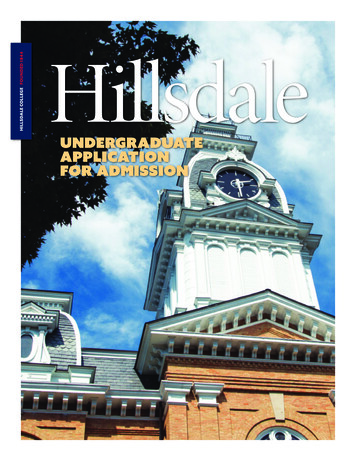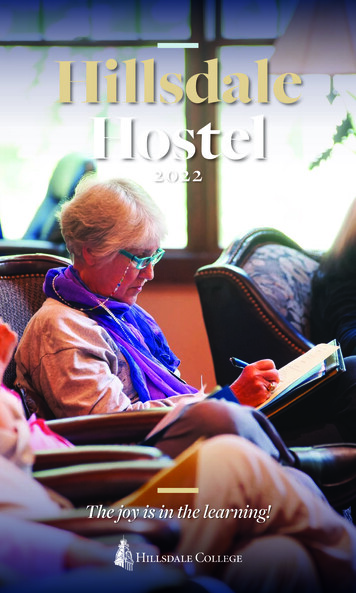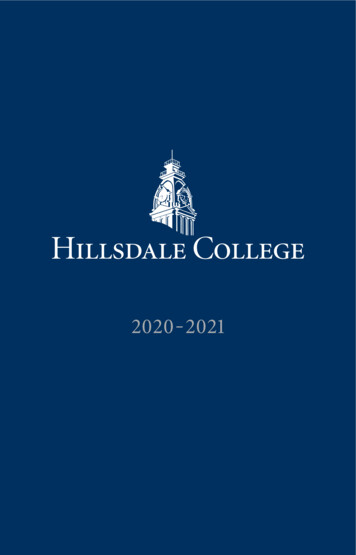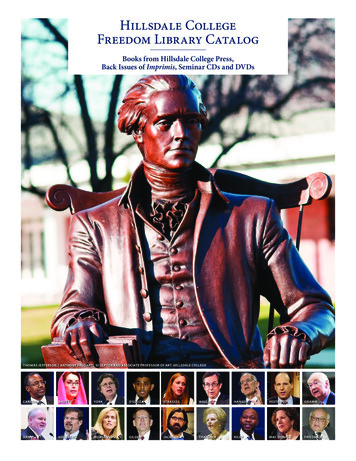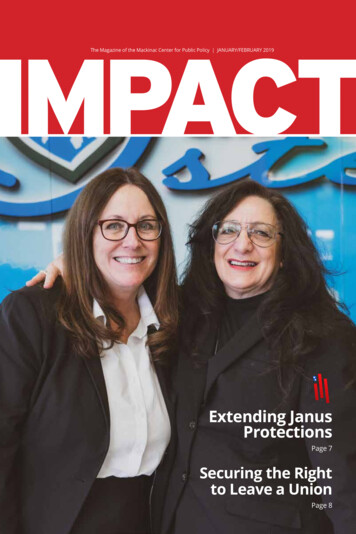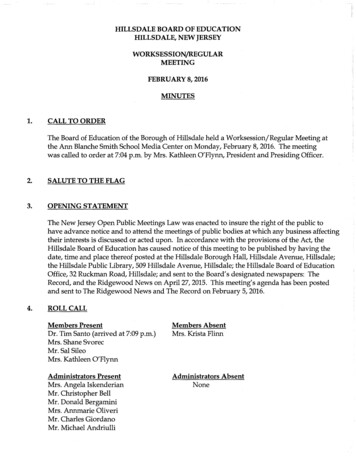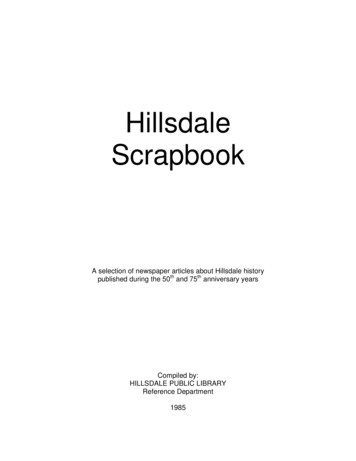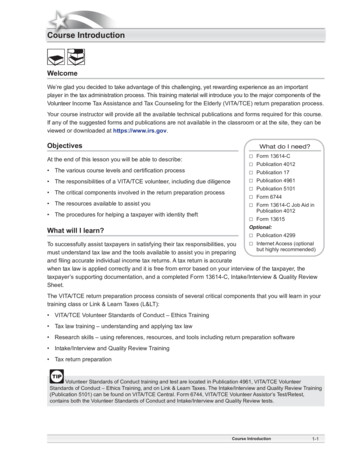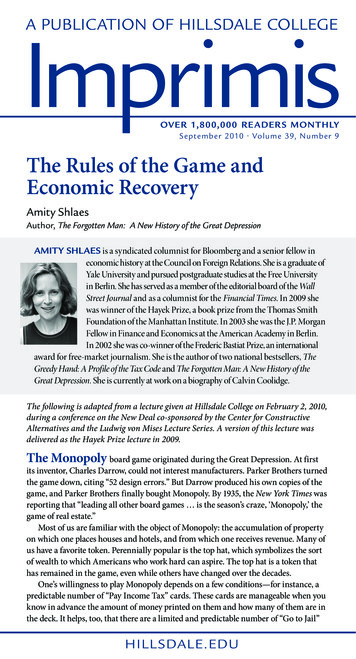
Transcription
A PUBLICATION OF HILLSDALE COLLEGEImprimisOVER 1,800,000 READER S MONTHLYSeptember 2010 Volume 39, Number 9The Rules of the Game andEconomic RecoveryAmity ShlaesAuthor, The Forgotten Man: A New History of the Great DepressionAMITY SHLAES is a syndicated columnist for Bloomberg and a senior fellow ineconomic history at the Council on Foreign Relations. She is a graduate ofYale University and pursued postgraduate studies at the Free Universityin Berlin. She has served as a member of the editorial board of the WallStreet Journal and as a columnist for the Financial Times. In 2009 shewas winner of the Hayek Prize, a book prize from the Thomas SmithFoundation of the Manhattan Institute. In 2003 she was the J.P. MorganFellow in Finance and Economics at the American Academy in Berlin.In 2002 she was co-winner of the Frederic Bastiat Prize, an internationalaward for free-market journalism. She is the author of two national bestsellers, TheGreedy Hand: A Profile of the Tax Code and The Forgotten Man: A New History of theGreat Depression. She is currently at work on a biography of Calvin Coolidge.The following is adapted from a lecture given at Hillsdale College on February 2, 2010,during a conference on the New Deal co-sponsored by the Center for ConstructiveAlternatives and the Ludwig von Mises Lecture Series. A version of this lecture wasdelivered as the Hayek Prize lecture in 2009.The Monopoly board game originated during the Great Depression. At firstits inventor, Charles Darrow, could not interest manufacturers. Parker Brothers turnedthe game down, citing “52 design errors.” But Darrow produced his own copies of thegame, and Parker Brothers finally bought Monopoly. By 1935, the New York Times wasreporting that “leading all other board games is the season’s craze, ‘Monopoly,’ thegame of real estate.”Most of us are familiar with the object of Monopoly: the accumulation of propertyon which one places houses and hotels, and from which one receives revenue. Many ofus have a favorite token. Perennially popular is the top hat, which symbolizes the sortof wealth to which Americans who work hard can aspire. The top hat is a token thathas remained in the game, even while others have changed over the decades.One’s willingness to play Monopoly depends on a few conditions—for instance, apredictable number of “Pay Income Tax” cards. These cards are manageable when youknow in advance the amount of money printed on them and how many of them are inthe deck. It helps, too, that there are a limited and predictable number of “Go to Jail”HILL SDALE.EDU
HILLSDALE COLLEGE: PURSUING TRUTH DEFENDING LIBERT Y SINCE 1844cards. This is what Frank Knight of theUniversity of Chicago would call a knowable risk, as opposed to an uncertainty.Likewise, there must be a limited andpredictable number of “Chance” cards.In other words, there has to be some certainty that property rights are secure andthat the risks to property are few in number and can be managed.The bank must be dependable, too.There is a fixed supply of Monopolymoney and the bank is supposed to follow the rules of the game, exercising littleor no independent discretion. If playerssit down at the Monopoly board only todiscover a bank that overreaches or istoo unpredictable or discretionary, we allknow what happens. They will walk awayfrom the board. There is no game.advisory group—Felix Frankfurter,Frances Perkins, George Warren,Marriner Eccles and Adolf Berle, amongothers—was sometimes known as a BrainTrust. The mystery had something to dowith a shortage of money, we are told, andin the end, only a Brain Trust’s tinkeringwith the money supply saved us. The corollary to this view is that the governmentknows more than American businessdoes about economics.Another common presumption is thatcleaning up Wall Street and getting rid ofwhite-collar criminals helped the nationrecover. A second is that property rightsmay still have mattered during the 1930s,but that they mattered less than government-created jobs, shoring up homeowners, and getting the money supplyright. A third is that American democracywas threatened by the rise of a potentialplutocracy, and that the Wagner Act of1935—which lent federal support to laborunions—was thus necessary and proper.How is this game relevant to the GreatFourth and finally, the traditional view ofDepression? We all know the traditionalthe 1930s is that action by the governmentnarrative of thatwas good, whereas inacevent: The stocktion would have been Imprimis (im-pri-mis),market crash generfatal. The economic[Latin]: in the first placeated an economiccrisis mandated anyEDITOR Katrina. One in fourkind of action, no matDouglas A. Jeffreywas unemployed inter how far removed itDEPUTY EDITORTimothy W. Casparthe first few years. Itmight be from soundCOPY EDITORresulted from a commonetary policy. AlongMonica VanDerWeidebination of monetary,these lines the humorART DIRECTORAngela Lashawaybanking, credit,ist Will Rogers wrotePRODUCTION MANAGERinternational, andin 1933 that if FranklinLucinda Grimmconsumer confidenceRoosevelt had “burnedCIRCULATION MANAGERPatricia A. DuBoisfactors. The terribledown the capital, weSTAFFASSISTANTSthing about it was thewould cheer and say,Kim Ellsworthduration of a high‘Well at least we got aWanda OxengerMary Jo Von Ewegenlevel of unemployfire started, anyhow.’”Copyright 2010HillsdaleCollegement, which averagedTo put this officialThe opinions expressed in Imprimis are notin the mid teens forversion of the 1930s innecessarily the views of Hillsdale College.the entire decade.terms of the MonopolyPermission to reprint in whole or in part isThe second thingboard: The Americanhereby granted, provided the following creditline is used: “Reprinted by permission fromwe usually learn iseconomy was failingImprimis, a publication of Hillsdale College.”that the Depressionbecause there were tooSUBSCRIPTION FREE UPON REQUEST.was mysterious—amany top hats lordingISSN 0277-8432problem that onlyit about on the board,Imprimis trademark registered in U.S.Patent and Trade Office #1563325.experts with doctortrying to establish aates could solve. Thatplutocracy, and becauseis why FDR’s floatingthere was no bank toRelevanceto the 1930s2
HILLSDALE COLLEGE: PURSUING TRUTH DEFENDING LIBERT Y SINCE 1844hand out money. Under FDR, the federalgovernment became the bank and pulledAmerica back to economic health.When you go to research the 1930s,however, you find a different story. It isof course true that the early part of theDepression—the years upon which mosteconomists have focused—was an economic Katrina. And a number of NewDeal measures provided lasting benefitsfor the economy. These include the creation of the Securities and ExchangeCommission, the push for free trade ledby Secretary of State Cordell Hull, and theestablishment of the modern mortgageformat. But the remaining evidence contradicts the official narrative. Overall, itcan be said, government prevented recovery. Herbert Hoover was too active, not toopassive—as the old stereotypes suggest—while Roosevelt and his New Deal policiesimpeded recovery as well, especially during the latter half of the decade.In short, the prolonged Depression canbe put down to government arrogance—arrogance that came at the expense of economic common sense, the rule of law, andrespect for property rights.Arrogance andDiscretionConsider the centerpiece of the NewDeal’s first 100 days, the NationalRecovery Administration (NRA), whichwas in effect an enormous multisector mechanism calibrated to managethe business cycle through industrialcodes that, among other things, regulated prices. The principles on which itscodes were based appear risible from theperspective of microeconomics and common sense. They included the idea thatprices needed to be pushed up to makerecovery possible, whereas competitionconstrained recovery by driving pricesdown. They held that big firms in industry—those “too big to fail”—were to writecodes for all members of their sector,large and small—which naturally workedto the advantage of those larger firms.As for consumer choice, it was deemedinefficient and an inhibitor of recovery.The absurdity of these principles wasoverlooked, however, because they wereput forth by great minds. One member ofthe Brain Trust, Ray Moley, described themyopic credentialism of his fellow BrainTruster, Felix Frankfurter, in this way:The problems of economic life wereto Frankfurter matters to be settledin a law office, a court room, oraround a big labor-managementbargaining table . . . . The government was the protagonist. Its agentswere its lawyers and commissioners.The antagonists were big corporatelawyers. In the background weremisty principals whom Frankfurternever really knew at first hand . . . .These background figures wereowners of the corporations, managers, workers and consumers.One family that was targeted by NRAbureaucrats was the Schechters, who werewholesale chicken butchers in Brooklyn.The NRA code that aimed to regulatewhat they did was called The Code of FairCompetition for the Live Poultry IndustryIn Perpetuity: An Update from the Founders CampaignSINCE HILLSDALE COLLEGE LAUNCHED its endowment and capital campaign, more than155,000 benefactors from across the country have contributed. This includes Imprimis subscribers,trustees, alumni, parents, faculty, staff, and students. From small to large donations, these giftsare securing Hillsdale’s independence and advancing its teaching mission on and off campus.For more information—or to make a gift to Hillsdale College—contact the Founders Campaign Office:founders.campaign@hillsdale.edu (517) 607-2600
SEPTEMBER 2010 VOLUME 39, NUMBER 9 hillsdale.eduAn audio version of Imprimisis available online athillsdale.edu/imprimisof the Metropolitan Area in and about theCity of New York. And according to thiscode, the Schechters did all the wrongthings. They paid their butchers too little.They charged prices that were too low.They allowed their customers to picktheir own chickens. Worst of all, they solda sick chicken. As a result of these supposed crimes, they were prosecuted.The prosecution would have beencomic if it were not business tragedy.Imagine the court room scene: On oneside stands Walter Lyman Rice, a graduateof Harvard Law School, representing thegovernment. On the other stands a smallman in the poultry trade, Louis Spatz,who is afraid of going to jail. Spatz tries todefend his actions. But he barely speaksEnglish, and the prosecutor bullies him.Nevertheless, Spatz is now and then ableto articulate, in his simple and commonsense way, how business really works.Prosecution: But you do not claim tobe an expert?Spatz: No.Prosecution: On the competitivepractices in the live poultry industry?Spatz: I would want to get paid, if Iwas an expert.Prosecution: You are not an expert!Spatz: I am experienced, but not anexpert . . . .Prosecution: You have not studiedagricultural economics?Spatz: No, sir.Prosecution: Or any sort ofeconomics?Spatz: No, sir.Prosecution: What is youreducation?Spatz: None; very little.Prosecution: None at all?Spatz: Very little.Then at one point this everyman sort ofpulls himself together.Prosecution: And you wouldnot endeavor to explain economicconsequences of competitive practices?Spatz: In my business I am the besteconomist.Prosecution: What is that?Spatz: In my business I am the besteconomizer.Prosecution: You are the besteconomizer?Spatz: Yes, without figuring.Prosecution: I wish to have thatword spelled in the minutes, just ashe stated it.Spatz: I do not know how to spell.This dialogue matters because littlebusinesses like Schechter Poultry are thenatural drivers of recovery, and duringthe Great Depression they weren’t allowedto do that driving. They weren’t allowedto compete and accumulate wealth—or,in terms of Monopoly, to place a house orhotel on their property. Instead they weresidelined. The Schechter brothers ultimatelywon their case in the Supreme Court in1935. But the cost of the lawsuits combinedwith the Depression did not go away.Regarding monetary policy, it is clearthat there wasn’t enough money in theearly 1930s. So Roosevelt was not wrongin trying to reflate. But though hisgeneral idea was right, the discretionary aspect of his policy was terrifying.As Henry Morgenthau reports in hisdiaries, prices were set by the presidentpersonally. FDR took the U.S. off thegold standard in April 1933, and by summer he was setting the gold price everymorning from his bed. Morgenthaureports that at one point the presidentordered the gold price up 21 cents. Why21, Morgenthau asked. Roosevelt replied,because it’s 3 x 7, and three is a luckynumber. “If anyone knew how we setthe gold price,” wrote Morgenthau in hisdiary, “they would be frightened.”Discretionary policies aimed at cleaning up Wall Street were destructive aswell. The New Dealers attacked thewealthy as “money changers” and “Princesof Property.” In 1937, after his re-election,Roosevelt delivered an inaugural address5
HILLSDALE COLLEGE: PURSUING TRUTH DEFENDING LIBERT Y SINCE 1844Honor.Learning.Self-Government.“A Hillsdale College student is honorablein conduct, honest in word and deed,dutiful in study and service, and respectfulof the rights of others. Through educationthe student rises to self-government.”— Hillsdale College Honor Codein which he described government asan instrument of “unimagined power”which should be used to “fashion a higherorder of things.” This caused businessto freeze in its tracks. Companies wenton what Roosevelt himself resentfullytermed a “capital strike.”These capital strikers mattered becausethey were even more important to recovery than the Schechters. Consider the caseof Alfred Lee Loomis, who had the kindof mind that could contribute significantly to Gross Domestic Product and jobcreation. During the First World War, hehad improved the design of firearms forthe U.S. Army. In the 1920s, he becamewealthy through his work in investmentbanking. He moved in a crowd that wasdeveloping a new form of utility companythat might finally be able to marshal thecapital to bring electricity to the AmericanSouth. But when Loomis saw that theRoosevelt administration was haulingutilities executives down to Washingtonfor hearings, he shut down his business,retreated to his Tudor house, and ran akind of private think tank for his ownbenefit. We have heard a lot about a laborsurfeit in the 1930s. Here is a heresy: Whatif there was a shortage of talent brought onby declarations of class warfare?Another challenge to the Depressioneconomy was tax increases. While theseincreases didn’t achieve the social equality at which they aimed, they did significant damage by confiscating too much6DO YOU KNOW ofan exceptional student whowould benefit from learningmore about Hillsdale College’snationally recognized liberalarts curriculum? If so, contactus for additional informationor join us on campus fora personalized visit. (517) ssionsindividual and corporate property. As aresult, many individuals and businessessimply reduced or halted production—especially as the New Deal wore on. In thelate 1930s, banker Leonard Ayres of theCleveland Trust Company said in the NewYork Times: “For nearly a decade now thegreat majority of corporations have beenlosing money instead of making it.”As for big labor, the Wagner Act of1935 proved to be quite destructive. Itbrought on drastic changes at factories,including the closed shop—the exclusionof non-union members. Another innovation it helped bring about was the sit-downstrike, which threatened the basic propertyright of factory owners to close their doors.Most importantly, it gave unions thepower to demand higher wages—and theydid. A wage chart for the 20th centuryshows that real wages in the 1930s werehigher than the trend for the rest of thecentury. This seems perverse, consideringthe economic conditions at the time. Theresult was high paying jobs for a few andhigh unemployment for everyone else. Thereality of overpriced labor can be seen inseveral stock phrases coming out of theGreat Depression —“Nice work if you canget it,” for example, was the refrain of aGershwin song performed by Fred Astairein The Damsel in Distress, a film releasedin 1937 at the zenith of union power.To return to the Monopoly boardmetaphor, the problem in the 1930s wasnot that there was no bank. It was that
SEPTEMBER 2010 VOLUME 39, NUMBER 9 hillsdale.eduthere was too much bank—in the form ofthe federal government. The governmenttook an arbitrary approach to the moneysupply and made itself the most powerful player. It shoved everyone else asideso that it could monopolize the board.Benjamin Anderson, a Chase economistat the time, summed it up in a book aboutthe period: “Preceding chapters haveexplained the Great Depression of 1930 to1939 as due to the efforts of the governments and very especially the governmentof the United States to play god.”ignored, notwithstanding the status oftheir bonds under bankruptcy law. Thecurrent administration made a politicaldecision to subordinate those contractsto union demands. That sent a dangeroussignal for the future that U.S. bonds arenot trustworthy.Three other threats to property loom.One is tax increases, such as the coming expiration of the Bush tax cuts. Moretaxes mean less private property. A secondthreat is in the area of infrastructure.Stimulus plans tend to emphasize infrastructure—especially roads and railroads.And after the Supreme Court’s Kelo decision of 2005, the federal government willhave enormous license to use eminentIt is not hard to see some of today’s troudomain to claim private property forbles as a repeat of the errors of the 1930s.these purposes. Third and finally, there isThere is arrogance up top. The federal gov- the worst kind of confiscation of privateernment is dilettantish with money andproperty: inflation, which excessive govexhibits disregard and even hostility to allernment spending necessarily encourages.other players. It is only as a result of thisMany of us sense that inflation is closerthat economic recovery seems out of reach. than the country thinks.The key to recovery, now as in theIf the experience of the Great1930s, is to be found in property rights.Depression teaches anything, it is thatThese rights suffer under our currentproperty rights must be firmly establishedpolitics in several ways. The mortgageor else we will not have the kind of ecocrisis, for example, arose out of a longnomic activity that leads to strong recovery.standing erosion of the property rightsThe Monopoly board game reminds usconcept—first on the part of Fannie Maethat economic growth isn’t mysterious andand Freddie Mac, but also on that of theinscrutable. Economic growth depends onFederal Reserve. Broadening FDR’s entitle- the impulse of the small businessman andment theories, Congress taught the counentrepreneur to get back in the game. Intry that home ownership was a “right.”order for this to happen, we don’t need aThis fostered a misunderstanding of whatperfect government. All we need is one thatproperty is. The owners didn’t realize what is “not too bad,” whose rules are not conownership entailed—that is, they didn’tstantly changing and snuffing out the willgrasp that they were obligated to deliver on ingness of these players to take risks. Wethe terms of the contract of their mortgage. need a government under which the moneyIn the bipartisan enthusiasm for maksupply doesn’t change unpredictably, thereing everyone an owner, our governmentare not too many “Go to Jail” cards, anddebased the concept of home ownership.the top hats are confident in the possibilityProperty rights are endangered asof seeing significant returns on investment.well by the ongoingRecovery won’tassault on contractshappen from thegenerally. A perfecttop. But when thoseexample of this wasat the top step backthe treatment ofand create the properDID YOU KNOW?Chrysler bonds duringconditions, it willIfyouwouldliketoreceiveImprimisDigital,the company’s bankhappen down therean e-mail supplement to Imprimis thatruptcy, where senioron the board—onecontains speeches different from those inthe print version, go to hillsdale-email.comsecured creditors werehouse at a time. and enter your name and e-mail address.Relevance for Today7
In 2002 she was co-winner of the Frederic Bastiat Prize, an international award for free-market journalism. She is the author of two national bestsellers, The Greedy Hand: A Profile of the Tax Code and The Forgotten Man: A New History of the Great Depression. She is currently at work on a biography of Calvin Coolidge. Imprimis
